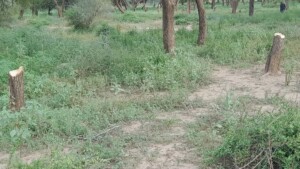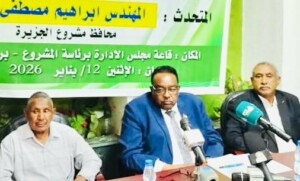Military junta blamed for Sudan’s economic woes
The October 25, 2021, military coup and the close relationships between military companies and Sudanese businessmen are the root causes of Sudan’s current economic crisis, economic experts Khaled Mohamed Ahmed and Abdelrahman Eisa explained in an interview with Radio Dabanga on Wednesday.
 Lt Gen Abdelfattah El Burhan, Commander of the SAF, addressing military recruits (File Photo: social media)
Lt Gen Abdelfattah El Burhan, Commander of the SAF, addressing military recruits (File Photo: social media)
The October 25, 2021, military coup and the close relationships between military companies and Sudanese businessmen are the root causes of Sudan’s current economic crisis, economic experts Khaled Mohamed Ahmed and Abdelrahman Eisa explained in an interview with Radio Dabanga on Wednesday.
In an interview with Radio Dabanga on Wednesday, economic analyst Khaled Mohamed Ahmed talked about the economic repercussions of the military coup which led to extreme poverty for most of the Sudanese.
Ahmed said that among the main reasons behind the 2021 coup were economic factors, related to the fear of Sudanese capitalist businessmen to lose their grip on the market and the common interests between this group and military companies.
The coup blocked the way for the five packages that Abdallah Hamdok had initiated in order to lead the country to economic safety, he said.
He explained that Hamdok intended to tackle, through the five packages, a set of problems that impeded the growth of the Sudanese economy, including the control of military institutions over the economy. The military apparatus is estimated to control as much as 82 per cent of Sudan’s economy according to Ahmed; money that few ordinary Sudanese will ever benefit from.
Hamdok’s government should have encouraged exports and regulated them through the government system, especially gold exports and agricultural products, such as cotton and bananas. These exports are now dominated by foreign companies and are exported without controls, Ahmed explained.
Both the Sudan Armed Forces (SAF), commanded by Chairman of Sudan’s Sovereignty Council and coup-leader Abdelfattah EL Burhan, and the infamous Rapid Support Forces (RSF), commanded by Deputy Chairman of Sudan’s Sovereignty Council Gen Mohamed Hamdan ‘Hemeti’ Dagalo, hugely benefit from Sudan’s gold exports.
The RSF have long been associated with the control of gold mining in Darfur and have built up a vast business empire that captures not only a large part of the country’s gold industry but also have huge interests in many sectors of the Sudanese economy. The anti-corruption NGO Global Witness published a report in 2019 about the financial networks behind the RSF.
The economist pointed out that the Hamdok government had put forward a proposal to establish a chamber of commerce linked to foreign trade and a cotton stock exchange, but the coup cut off this plan.
International relations
Political economist Abdelrahman Eisa said that El Burhan’s coup on October 25, 2021, caused “the closure of the international finance windows that opened to Sudan after the 2018 December revolution”.
The October 25 military coup last year moved international donors to suspend financial aid, which saw Sudan lose $4.4 bn in support and contributed to the country’s current funding crisis and economic despair.
Eisa told Dabanga Sudan that the coup had some positive effects because it forced the military institution that controls the country’s economic resources to give up some resources “in order to beautify its decisions in the eyes of the people”, but he stressed that these decisions did not address the economic crisis.
The negative consequences of the putschists’ decisions outweigh the positives, he explained.
El Burhan’s decisions a year ago “brought parasitic capitalism back to the scene and returned all the stolen money recovered [by the Empowerment Removal Committee* set up by the government of Hamdok] for the benefit of the people to the thieves,” Eisa said and explained that it aggravated the economic situation.
The ERC was forced to stop its activities and many of its members were arrested after the coup.











 and then
and then